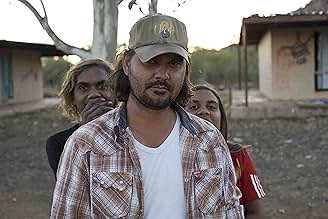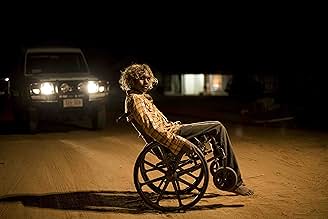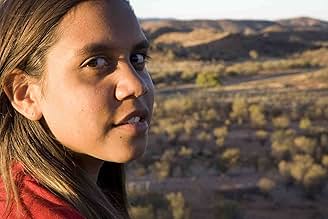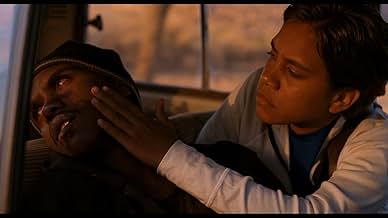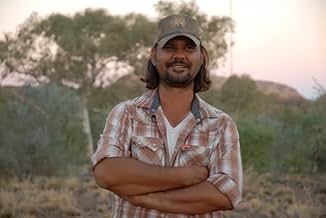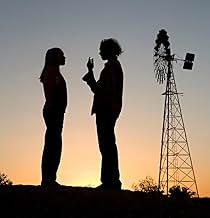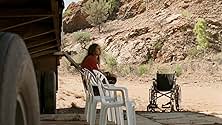CALIFICACIÓN DE IMDb
7.0/10
3.8 k
TU CALIFICACIÓN
Un chico y su novia escapan de la comunidad aborigen en la que viven y van a la ciudad, Alice Springs, en busca de una vida mejor.Un chico y su novia escapan de la comunidad aborigen en la que viven y van a la ciudad, Alice Springs, en busca de una vida mejor.Un chico y su novia escapan de la comunidad aborigen en la que viven y van a la ciudad, Alice Springs, en busca de una vida mejor.
- Dirección
- Guionistas
- Elenco
- Premios
- 22 premios ganados y 14 nominaciones en total
Mitjili Napanangka Gibson
- Nana
- (as Mitjili Gibson)
Matthew Gibson
- Samson's Brother
- (as Matthew 'MG' Gibson)
- …
Noreen Robertson Nampijinpa
- Community Lady
- (as Noreen Robertson)
Kenrick Martin
- Wheelchair Boy
- (as Kenrick 'Ricco' Martin)
- Dirección
- Guionistas
- Todo el elenco y el equipo
- Producción, taquilla y más en IMDbPro
Opiniones destacadas
I just saw this film at a screening in Melbourne following its premiere at the Adelaide Film Festival and was highly impressed. Not often are we shown Aboriginal stories shown on the big screen and told with sensitivity and realism. The filming of the Central Australian landscapes are beautiful and the characters are sweet, endearing and maddening at times (the grandmother is the most joyful character and worth the price of admission alone). Following the story of two star crossed lovers and the reality of Aboriginal life in the Territories, this is a film that should be shown widely and help to dispel the myth that the Australian film industry is somehow lacking - with films like this being produced, it's certainly not - we just need to see more of it.
Saw this at Cinema Nova in Carlton this afternoon..There was a lineup of 100 deep to get into the cinema, something I have never experienced before at Cinema Nova..The movie started and there was silence..around us and in the movie! Words weren't needed..Things we have read, things we have been told about, we watch unfold in front our eyes..Unflinching in in it's portrayal of a culture and people abandoned and victimized by us Australians..The movie itself is brilliant, but what message will we take away from it? Go to work tomorrow and discuss with people how brilliant it is? Have lunch/dinner with friends and rave on about it's searing truth? We were ready to help the people affected by "Black Saturday" so generously, but what about these people who need such a huge helping hand and who have been truly abandoned by us even though they are the original bearers of this great land of ours? Such fantastic pictures we paint of Australia, mate! Sunny, beaches, seafood, Opera House, the Harbour bridge etc..but for these people the reality is painfully far from all that..
Deeply affecting for me, I hope that everyone at the cinema today felt the same..As a nation, we need to galvanize ourselves so that we may save this important heritage from becoming completely extinct..But I fear many of us will shy away at the magnitude of the task ahead..It's a race of people we have hardly ever understood and so different that we steer clear..Yes, I have been one of those people who have looked at them with suspicion in stores, in super-markets, in restaurants and cafés etc..I have learned a few things today and hope I can help in some way..
Watch this please, it's an important movie with huge social implications for our society and for us as Australians..Too beautiful for words, Samson and Delilah will take your breath away
Deeply affecting for me, I hope that everyone at the cinema today felt the same..As a nation, we need to galvanize ourselves so that we may save this important heritage from becoming completely extinct..But I fear many of us will shy away at the magnitude of the task ahead..It's a race of people we have hardly ever understood and so different that we steer clear..Yes, I have been one of those people who have looked at them with suspicion in stores, in super-markets, in restaurants and cafés etc..I have learned a few things today and hope I can help in some way..
Watch this please, it's an important movie with huge social implications for our society and for us as Australians..Too beautiful for words, Samson and Delilah will take your breath away
Those of us who have travelled the Australian Outback will recognise the backdrop to "Samson and Delilah" – aboriginals living in squalid housing amidst household garbage, derelict cars and ubiquitous dust. Warwick Thornton sets himself the difficult task of depicting the monotony, hopelessness and despair of this existence without boring and depressing the audience. To a large measure he succeeds, although this film will not appeal to those you go to the cinema to escape the real world. Thornton's great skill is to convey the developing relationship between the star-crossed lovers via body language rather than dialogue. The performances by untrained actors, especially Marissa Gibson (Delilah), are exceptional. Your view of this film is likely to be determined by whether you can empathise with the main characters and their inevitable misadventures. I certainly did, although I concede Samson's character was underdeveloped and very hard to like. Appropriately, the movie ends with a glimmer of hope based on the resilience and determination of aboriginal women.
A really good film showing the grim realities of Aboriginal life through the 'love-story' of Samson and Delilah.
What really impressed me with the film was the fact that both lead roles were played by amateurs. Both played their characters incredibly and (hopefully) have long and successful acting careers ahead of them.
Sure, there was little dialogue between them (Samson only says one word in the whole film) but to be honest as the film went on I grew to like this. Yes, you could argue that more dialogue would have developed their characters more, but by the end I had become comfortable with it and was glad that the director had taken this approach.
The cinematography is superb and the topic both harrowing and sad.
I scored the film an 8 because the last 10 minutes is basically romantic nonsense. Really the film should have finished at the car accident, but after a film that had so little light and positiveness then I can understand that it needed the solace that the 'romantic' ending gave it.
What really impressed me with the film was the fact that both lead roles were played by amateurs. Both played their characters incredibly and (hopefully) have long and successful acting careers ahead of them.
Sure, there was little dialogue between them (Samson only says one word in the whole film) but to be honest as the film went on I grew to like this. Yes, you could argue that more dialogue would have developed their characters more, but by the end I had become comfortable with it and was glad that the director had taken this approach.
The cinematography is superb and the topic both harrowing and sad.
I scored the film an 8 because the last 10 minutes is basically romantic nonsense. Really the film should have finished at the car accident, but after a film that had so little light and positiveness then I can understand that it needed the solace that the 'romantic' ending gave it.
Samson and Delilah, for the most part, appears to play out like True Romance as directed by Abbas Kiarostami; a love story of sorts between two relatively down and out people slowly chugging along in their lives, and yet pertaining to whatever law exists, within a working community torn apart by squalor and down-trodden existences whom decide to high tail it out of there in an attempt to start over out in the wider world. It is to first time director Warwick Thornton's credit that he manoeuvres a story about two disparate youngsters of opposing genders down a path that more-so resembles something such as Malick's Badlands than something in the vein of True Romance; Samson and Delilah a really rather wonderfully executed coming of age piece set amidst the lower echelons of Australia's indigenous community, a political parable linked to Australia's indigenous communities' 'place' in Australian society and a rather sweet, underplayed love story with ample attention to the duality those therein share.
The film begins with one half of the titular duo waking up on this, another hot; lazy; sluggish morning in dusty Outback Australia. We wake up into the film with him, a young boy named Samson, played by Rowan McNamara and here cutting rather-a dash as Lasith Malinga, whom lives alone with his brother in a small wooded house in a small street doubling up as an entire community. Samson enjoys sniffing motor oil, a batch of which he has tucked away in a plastic bottle enabling him to remove the lid once in a while so as to inhale a fix. In other areas of living, the man is positively Neanderthal; the drawing on walls calls to mind that of crude scribblings on caves one might have done millennias ago, his lack of speech going hand in hand with his ambling around from place to place – attempts at 'wooing' a female ending as we predict whilst the clubbing of a wild animal during a bout of Heaven-only-knows-what instills a crude, highly primitive sense about the guy. Upon waking up, he tries to steal a quick five minutes on his brother's guitar, a musical instrument requiring grace and precision, and he does so very badly before he is forced off it: dismissing those whom go on to strike up a good sound as a four-man-band.
Additionally awakening on this morning is Delilah, and additionally played by first-time actress Marissa Gibson; a character whom must care for her elderly grandmother, her last surviving relative and make sure to provide her with the correct medicine and such in what is a demonstration of precision and grace instilled into an activity which Delilah is able to execute. Delilah and her relative additionally spend their time creating neat mosaics on basic canvases so that they may be sold in a nearby town, activities again which require creativity and precision which it's established the man Delilah shares the title of the film with lacks. Samson and Delilah converge, once, outside of a store during this day; very little is said but much is implied through body language and suggestion, an early coming together a demonstration of the pair of them communicating through action and reaction which will go on to forge the essential characteristics of their bond.
In the evenings, music is again an item that arises; for Samson, the tuning into an FM radio as a DJ churns out popular music for anybody willing to send in a request is the order of proceedings; his lack of having a definitive taste and therefore having to feed off of what everybody else wish to hear prominent. Delilah, on the other hand, tunes into a very specified brand of music; a tape cassette of Latin American music which she enjoys by herself in the confines of an automobile on its tape player. These characters could not be any further apart in this sense, and yet opposites begin to attract; a final instance of binary opposition as the catalysts which push them together being the shooting of Delilah through hues of red as Thornton constructs an objectification of Samson around her gaze: his wiry shirtless dancing to blued out compositions having her come to feel what she previously did not.
The film mutates into the having of them leave the slum, a branching out into the wider world driven by two tragic instances that befalls either character; instances specifically linked to internal problems with whatever little family each of them has, a breaking up through whatever means or for whatever reason ultimately the item that pushes the disparate pair together. The leaving of the township for a homeless existence beneath a flyover bridge sees them maintain a solid partnership for the best part without ever actually saying anything; an unusual characteristic that will for some carrying with it problems more broadly linked to realism but in actuality, is probably some sort of sociological metaphor for the general marginalisation of Australia's indigenous people (that is to say, the literal taking away of their voices) by the state itself. Thornton strikes us as a competent director, his cine-literacy rendering this on screen silent romance one of which is executed with the sort of vigour imbued within, whilst most probably drawing inspiration from, something such as Chaplin's City Lights. Regardless of sources of inspiration, and more-over the mere labelling of it as "Kiarostami does Natural Born Killers by way of City Lights", the film is an exciting; enthralling debut from someone whose future work ought to be looked forward to with great anticipation.
The film begins with one half of the titular duo waking up on this, another hot; lazy; sluggish morning in dusty Outback Australia. We wake up into the film with him, a young boy named Samson, played by Rowan McNamara and here cutting rather-a dash as Lasith Malinga, whom lives alone with his brother in a small wooded house in a small street doubling up as an entire community. Samson enjoys sniffing motor oil, a batch of which he has tucked away in a plastic bottle enabling him to remove the lid once in a while so as to inhale a fix. In other areas of living, the man is positively Neanderthal; the drawing on walls calls to mind that of crude scribblings on caves one might have done millennias ago, his lack of speech going hand in hand with his ambling around from place to place – attempts at 'wooing' a female ending as we predict whilst the clubbing of a wild animal during a bout of Heaven-only-knows-what instills a crude, highly primitive sense about the guy. Upon waking up, he tries to steal a quick five minutes on his brother's guitar, a musical instrument requiring grace and precision, and he does so very badly before he is forced off it: dismissing those whom go on to strike up a good sound as a four-man-band.
Additionally awakening on this morning is Delilah, and additionally played by first-time actress Marissa Gibson; a character whom must care for her elderly grandmother, her last surviving relative and make sure to provide her with the correct medicine and such in what is a demonstration of precision and grace instilled into an activity which Delilah is able to execute. Delilah and her relative additionally spend their time creating neat mosaics on basic canvases so that they may be sold in a nearby town, activities again which require creativity and precision which it's established the man Delilah shares the title of the film with lacks. Samson and Delilah converge, once, outside of a store during this day; very little is said but much is implied through body language and suggestion, an early coming together a demonstration of the pair of them communicating through action and reaction which will go on to forge the essential characteristics of their bond.
In the evenings, music is again an item that arises; for Samson, the tuning into an FM radio as a DJ churns out popular music for anybody willing to send in a request is the order of proceedings; his lack of having a definitive taste and therefore having to feed off of what everybody else wish to hear prominent. Delilah, on the other hand, tunes into a very specified brand of music; a tape cassette of Latin American music which she enjoys by herself in the confines of an automobile on its tape player. These characters could not be any further apart in this sense, and yet opposites begin to attract; a final instance of binary opposition as the catalysts which push them together being the shooting of Delilah through hues of red as Thornton constructs an objectification of Samson around her gaze: his wiry shirtless dancing to blued out compositions having her come to feel what she previously did not.
The film mutates into the having of them leave the slum, a branching out into the wider world driven by two tragic instances that befalls either character; instances specifically linked to internal problems with whatever little family each of them has, a breaking up through whatever means or for whatever reason ultimately the item that pushes the disparate pair together. The leaving of the township for a homeless existence beneath a flyover bridge sees them maintain a solid partnership for the best part without ever actually saying anything; an unusual characteristic that will for some carrying with it problems more broadly linked to realism but in actuality, is probably some sort of sociological metaphor for the general marginalisation of Australia's indigenous people (that is to say, the literal taking away of their voices) by the state itself. Thornton strikes us as a competent director, his cine-literacy rendering this on screen silent romance one of which is executed with the sort of vigour imbued within, whilst most probably drawing inspiration from, something such as Chaplin's City Lights. Regardless of sources of inspiration, and more-over the mere labelling of it as "Kiarostami does Natural Born Killers by way of City Lights", the film is an exciting; enthralling debut from someone whose future work ought to be looked forward to with great anticipation.
¿Sabías que…?
- TriviaWarwick Thornton cast his own brother Scott in the film as Gonzo, despite his sibling being an alcoholic since the age of 16. Thornton insisted that his brother go into rehab before starting on the movie. Scott managed to clean up for the film but relapsed back into alcoholism two weeks after shooting completed.
- ConexionesFeatured in At the Movies: Cannes Film Festival 2009 (2009)
Selecciones populares
Inicia sesión para calificar y agrega a la lista de videos para obtener recomendaciones personalizadas
- How long is Samson & Delilah?Con tecnología de Alexa
Detalles
- Fecha de lanzamiento
- País de origen
- Sitios oficiales
- Idiomas
- También se conoce como
- Samson and Delilah
- Locaciones de filmación
- Productoras
- Ver más créditos de la compañía en IMDbPro
Taquilla
- Total a nivel mundial
- USD 2,528,731
- Tiempo de ejecución1 hora 40 minutos
- Color
- Mezcla de sonido
- Relación de aspecto
- 1.85 : 1
Contribuir a esta página
Sugiere una edición o agrega el contenido que falta

Principales brechas de datos
By what name was Samson & Delilah (2009) officially released in India in English?
Responda
